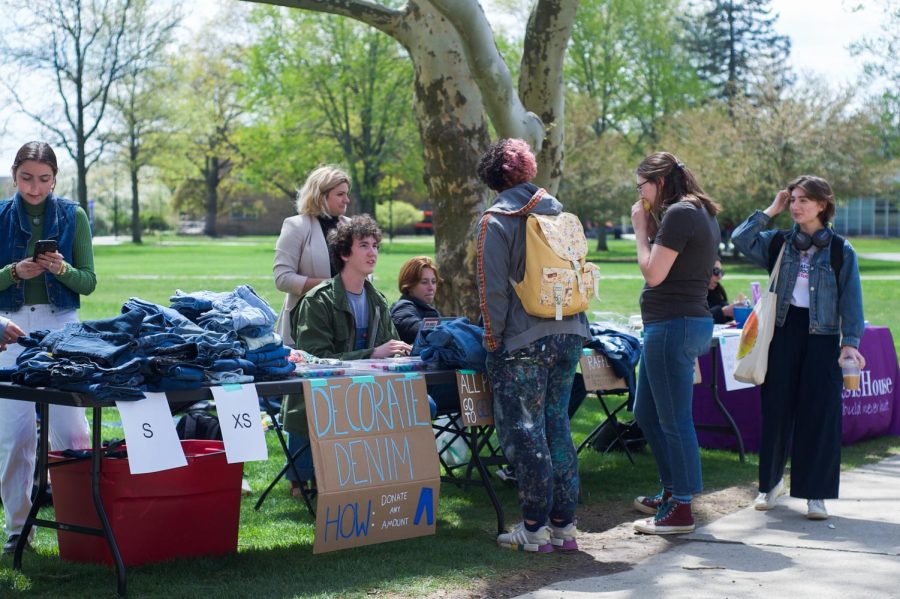Take Back the Night Promotes Intersectional Allyship
This year, I organized Take Back the Night, a Survivors of Sexual Harm and Allies event that was intended to support and uplift sexual harm survivors and raise awareness about gender-based violence. My experience planning and speaking at Take Back the Night was emotional, exhausting, joyful, saddening, and incredibly rewarding.
Take Back the Night, a worldwide protest to combat sexual and gender-based violence, was first held in 1877 in London, England. Today, college campuses around the United States continue to hold Take Back the Night in support of sexual harm survivors.
Whenever I tell people I’m involved in SOSHA, there is a moment of silence. I can sense others’ discomfort with the simple acknowledgement that I am a survivor of sexual harm. I understand this. Sexual harm and gender-based violence is challenging to reckon with, and many people have not processed their own experiences of sexual violence. However, approximately one in three women worldwide experience some sort of physical or sexual violence in their lifetime, and women in college between the ages of 18–24 are three times more likely to experience sexual violence than women in general. It is clear that sexual violence is a massive issue, especially on college campuses. I joined SOSHA’s advocacy team to bring these issues of sexual violence to light.
After my experience with assault on Oberlin’s campus in January, I thought further about how the Oberlin community talks about topics pertaining to sexual harm. At Oberlin, we have important and necessary conversations about practicing consent, but we don’t talk often enough about what happens after consent is violated. What do you do if you or someone you know experiences sexual harm? Take Back the Night is an event which centers survivors in the conversation of sexual harm. Its goal is to address what members of our community can do if you or someone you know experiences sexual harm.
SOSHA’s third annual Take Back the Night in Peters Hall included a speak-out, where members from the Oberlin community spoke or sang about topics surrounding sexual harm, marched around campus, and celebrated resilience. During the speak-out and celebration, I felt so proud of all the speakers and performers for having the courage to share their stories. All the performers held so much beauty, strength, and resilience. I felt honored to share the stage with them.
I decided to perform at Take Back the Night somewhat spontaneously. I didn’t write my speech until a few days prior to the event. I was nervous to talk about my experience of sexual assault on Oberlin’s campus: I didn’t want my time at Oberlin to be defined by my experience of sexual violence. I didn’t want to deal with the questioning that can come when you tell people that you have experienced sexual assault. Still, I decided to speak at Take Back the Night because I no longer wanted to feel ashamed of what had happened to me. I hoped sharing my story would encourage other survivors to speak out. After my speech I felt an immense sense of power.
An element of planning Take Back the Night that was really important to me was making Take Back the Night as intersectional of an event as possible. As a Black woman, I have found that my experiences of sexual violence have been largely influenced by my race. Sometimes when talking about sexual violence, we leave out the history of sexual violence enacted against women of color in America. In order to have truthful discussions about sexual violence, we must acknowledge the variety of survivor experiences influenced by race, gender, sexuality, and class.
The most surprising aspect of the event for me was the outpouring of emotions from performers and audience members. After the speak-out, somebody came up to me in tears saying, “Your speech was amazing, I am so proud of you.” I had messages from people telling me what the speech and the event had meant to them and how it made them want to talk and process their own experiences of sexual violence more. Students talking publicly about experiences of sexual harm destigmatizes the topic of sexual assault. Sexual assault is incredibly isolating and devastating. To know that there are other people who have had similar experiences makes survivors feel less alone. In addition, we hope that people speaking about their experiences of sexual harm will force the Oberlin student body to deal with the pervasive issue of sexual violence on our campus.
Despite attending Oberlin College for less than a year, I have already heard countless stories of individuals experiencing sexual violence on campus. Outside of the SOSHA spaces, however, I notice that, as a community, we rarely talk about sexual violence. This lack of discussion stems from the discomfort in acknowledging that people in our community are capable of committing sexual harm. But in failing to acknowledge the sexual harm on our campus we are silencing sexual harm survivors. Only when we talking about issues of sexual harm can we support survivors and help end the rape culture that perpetuates sexual violence.
I ended my speech by addressing the allies present at the event: “To the allies here tonight, don’t take your role lightly. You can have an incredible impact with small acts of grace and support.” I say the same thing to all the readers of this article. I ask that you show support to sexual harm survivors and attend survivor visibility events. We must continue to talk about these issues and raise awareness in order to properly support sexual harm survivors.







